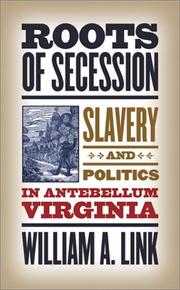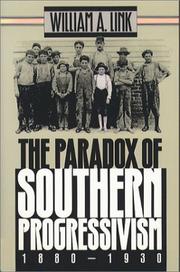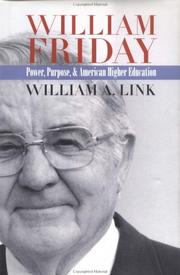| Listing 1 - 10 of 17 | << page >> |
Sort by
|
Book
ISBN: 1469608324 1469607778 146960776X 1469626551 9781469607771 9781469608327 9781469607764 9798890844309 9798893130614 Year: 2013 Publisher: Chapel Hill : University of North Carolina Press,
Abstract | Keywords | Export | Availability | Bookmark
 Loading...
Loading...Choose an application
- Reference Manager
- EndNote
- RefWorks (Direct export to RefWorks)
After conquering Atlanta in the summer of 1864 and occupying it for two months, Union forces laid waste to the city in November. William T. Sherman's invasion was a pivotal moment in the history of the South and Atlanta's rebuilding over the following fifty years came to represent the contested meaning of the Civil War itself. The war's aftermath brought contentious transition from Old South to New for whites and African Americans alike. Historian William Link argues that this struggle defined the broader meaning of the Civil War in the modern South, with no place embodying the region's past a
African Americans --- Memory --- Social conditions. --- Social aspects --- Atlanta (Ga.) --- United States --- Race relations --- History. --- History --- Influence. --- Retention (Psychology) --- Afro-Americans --- Black Americans --- Colored people (United States) --- Negroes --- City of Atlanta (Ga.) --- Intellect --- Psychology --- Thought and thinking --- Comprehension --- Executive functions (Neuropsychology) --- Mnemonics --- Perseveration (Psychology) --- Reproduction (Psychology) --- Africans --- Ethnology --- Blacks --- Black people

ISBN: 0807827711 0807856614 0807863203 9798890877406 9780807863206 Year: 2003 Publisher: Chapel Hill : University of North Carolina Press,
Abstract | Keywords | Export | Availability | Bookmark
 Loading...
Loading...Choose an application
- Reference Manager
- EndNote
- RefWorks (Direct export to RefWorks)
This text studies the role of slaves and free blacks in the politics of secession in antebellum Virginia. It places African Americans at the centre of events and argues that their acts of rebellion had powerful political repercussions throughout the period prior to the Civil War.
Slaves --- Virginia --- Political activity --- History --- 19th century --- African Americans --- Politics and government --- Government [Resistance to ] --- Passive resistance --- 1775-1865 --- Slavery --- Political aspects --- Race relations --- Secession --- United States --- Civil War, 1861-1865 --- Causes --- Enslaved persons --- Government, Resistance to --- Causes.

ISBN: 0807862991 9780807862995 0807820407 9780807820407 0807843768 9780807843765 9798890868558 0807845892 9780807845899 Year: 1992 Publisher: Chapel Hill : University of North Carolina Press,
Abstract | Keywords | Export | Availability | Bookmark
 Loading...
Loading...Choose an application
- Reference Manager
- EndNote
- RefWorks (Direct export to RefWorks)
Focusing on the cultural conflicts between social reformers and southern communities, William Link presents an important reinterpretation of the origins and impact of progressivism in the South. He shows that a fundamental clash of values divided reformers and rural southerners, ultimately blocking the reforms. His book, based on extensive archival research, adds a new dimension to the study of American reform movements. The new group of social reformers that emerged near the end of the nineteenth century believed that the South, an underdeveloped and politically fragile region, was in the midst of a social crisis. They recognized the environmental causes of social problems and pushed for interventionist solutions. As a consensus grew about southern social problems in the early 1900s, reformers adopted new methods to win the support of reluctant or indifferent southerners. By the beginning of World War I, their public crusades on prohibition, health, schools, woman suffrage, and child labor had led to some new social policies and the beginnings of a bureaucratic structure. By the late 1920s, however social reform and southern progressivism remained largely frustrated. Link's analysis of the response of rural southern communities to reform efforts establishes a new social context for southern progressivism. He argues that the movement failed because a cultural chasm divided the reformers and the communities they sought to transform. Reformers were paternalistic. They believed that the new policies should properly be administered from above, and they were not hesitant to impose their own solutions. They also viewed different cultures and races as inferior. Rural southerners saw their communities and customs quite differently. For most, local control and personal liberty were watchwords. They had long deflected attempts of southern outsiders to control their affairs, and they opposed the paternalistic reforms of the Progressive Era with equal determination. Throughout the 1920s they made effective implementation of policy changes difficult if not impossible. In a small-scale war rural folk forced the reformers to confront the integrity of the communities they sought to change.

ISBN: 1469611864 1469612585 9781469612584 9781469611853 1469611856 0807821675 9781469611860 9798893130720 Year: 2013 Publisher: Baltimore, Maryland : Baltimore, Md. : Project Muse, Project MUSE,
Abstract | Keywords | Export | Availability | Bookmark
 Loading...
Loading...Choose an application
- Reference Manager
- EndNote
- RefWorks (Direct export to RefWorks)
Few North Carolinians have been as well known or as widely respected as William Friday (1920-2012). The former president of the University of North Carolina remained prominent in public affairs in the state and elsewhere throughout his life and ranked as one of the most important American university presidents of the post-World War II era. In the second edition of this comprehensive biography, William Link traces Friday's long and remarkable career and commemorates his legendary life. Friday's thirty years as president of the university, from 1956 to 1986, spanned the greatest period of growth for higher education in American history, and Friday played a crucial role in shaping the sixteen-campus UNC system during that time. Link also explores Friday's influential work on nationwide commissions, task forces, and nonprofits, and in the development of the National Humanities Center and the growth of Research Triangle Park. This second edition features a new introduction and epilogue to enrich the narrative, charting the later years of Friday's career and examining his legacy in North Carolina and nationwide.
Friday, William C. --- University of North Carolina (System) --- UNC --- North Carolina. --- History. --- Presidents --- North Carolina
Book
ISBN: 0813042852 9780813042855 9780813037943 0813037948 Year: 2012 Publisher: Gainesville University Press of Florida
Abstract | Keywords | Export | Availability | Bookmark
 Loading...
Loading...Choose an application
- Reference Manager
- EndNote
- RefWorks (Direct export to RefWorks)
Arthur Link (1920-1998) was one of the great historians of his generation, a prolific author with a wide following inside and outside the profession. For many years the foremost authority on Woodrow Wilson, he wrote a five-volume biography of the president and edited a sixty-nine volume edition of Wilson's papers.Margaret Link (1918-1996), his wife and fellow North Carolinian, was the emotional core of the family. As an activist, she helped form an interdenominational crisis ministry in Princeton that reached out to the poor with counseling, clothing, and food, and she was a cofounder and president of the Association for the Advancement of Mental Health.In Links, their youngest son--an accomplished and award-winning historian--offers a moving and unsentimental biography of two individuals who experienced the intense change and tumult of the South during the mid-twentieth century. Drawing from a rich trove of letters, interviews with friends and family, and unique insights, Link offers a highly detailed, evocative portrait of the coming of age and lifelong partnership of his parents. Links combines the objectivity and critical judgment of the professional historian with the subjectivity and deep emotional connection of the memoirist who participated directly in part of the story.
Historians --- College teachers --- Link, Arthur S. --- Link, Margaret Douglas, --- Link family. --- Princeton University --- Faculty --- United States --- Social conditions --- Academicians --- Academics (Persons) --- College instructors --- College lecturers --- College professors --- College science teachers --- Lectors (Higher education) --- Lecturers, College --- Lecturers, University --- Professors --- Universities and colleges --- University academics --- University instructors --- University lecturers --- University professors --- University teachers --- Teachers --- Douglas, Margaret, --- Link (Family : --- Link, Arthur Stanley --- Đại-học Princeton --- Pʻu-lin-ssu-tun ta hsüeh --- Universität Princeton --- College of New Jersey (Princeton, N.J.)
Book
ISBN: 9798890853806 146966495X 9781469664941 1469664941 9781469664958 9781469664934 1469664933 Year: 2021 Publisher: Chapel Hill : The University of North Carolina Press,
Abstract | Keywords | Export | Availability | Bookmark
 Loading...
Loading...Choose an application
- Reference Manager
- EndNote
- RefWorks (Direct export to RefWorks)
"Frank Porter Graham (1886-1972) was one of the most consequential white southerners of the twentieth century. Born in Fayetteville and raised in Charlotte, he taught history at UNC, and in 1930, he became the university's fifteenth president. Affectionately known as 'Dr. Frank,' Graham spent two decades overseeing UNC's development into a world-class public institution. But he regularly faced controversy, especially as he was increasingly drawn into national leadership on matters such as intellectual freedom and the rights of workers. As a southern liberal, Graham became a prominent New Dealer, negotiator, and briefly a U.S. senator. Graham's reputation for problem solving through compromise led him into service under several presidents as a United Nations mediator, and he was outspoken as a white southerner regarding civil rights. Brimming with fresh insights, this definitive biography reveals how a personally modest public servant took his place on the national and world stage and, along the way, helped transform North Carolina"--
College presidents --- Statesmen --- Graham, Frank Porter, --- University of North Carolina (1793-1962) --- History.
Book
ISBN: 0813058228 0813057183 9780813057187 9780813056418 0813056411 Year: 2020 Publisher: Gainesville : University Press of Florida,
Abstract | Keywords | Export | Availability | Bookmark
 Loading...
Loading...Choose an application
- Reference Manager
- EndNote
- RefWorks (Direct export to RefWorks)
'United States Reconstruction across the Americas' explores how emancipation, nationhood and nationalism, and the spread of market capitalism - all central to United States Reconstruction - were interwoven with patterns of post-Civil War global, political, social, and economic developments.
Reconstruction (U.S. history, 1865-1877) --- Slavery --- Enslaved persons --- History. --- Emancipation --- Economic aspects. --- Jamaica --- History
Book
ISBN: 0813046211 0813045053 0813044138 9780813044132 9780813045054 9780813046211 Year: 2013 Publisher: Gainesville : University Press of Florida,
Abstract | Keywords | Export | Availability | Bookmark
 Loading...
Loading...Choose an application
- Reference Manager
- EndNote
- RefWorks (Direct export to RefWorks)
An edited collection resulting from four international conferences held between 2008 and 2010 on the theme of citizenship in the nineteenth-century American South.
African Americans --- Citizenship --- Slavery --- Social conditions --- History --- Southern States --- Politics and government --- Race relations
Book
ISBN: 0813057620 0813058767 0813065674 0813066611 Year: 2020 Publisher: Gainesville : University Press of Florida,
Abstract | Keywords | Export | Availability | Bookmark
 Loading...
Loading...Choose an application
- Reference Manager
- EndNote
- RefWorks (Direct export to RefWorks)
Tracing the development of the field of southern women's history over the past half century, Sisterly Networks shows how pioneering feminists laid the foundation for a strong community of sister scholars and delves into the work of an organization central to this movement, the Southern Association for Women Historians (SAWH). Launched in 1970, the SAWH provided programming, mentoring, fundraising, and outreach efforts to support women historians working to challenge the academic establishment. In this book, leading scholars reflect on their own careers in southern history and their experiences as women historians amid this pathbreaking expansion and revitalization of the field.
Women --- Women's studies --- Women --- History. --- History. --- Social conditions. --- Southern Association for Women Historians.
Book
ISBN: 1282257714 9786612257711 0080889808 0123748542 Year: 2010 Publisher: Amsterdam : Academic Press,
Abstract | Keywords | Export | Availability | Bookmark
 Loading...
Loading...Choose an application
- Reference Manager
- EndNote
- RefWorks (Direct export to RefWorks)
Statistical theory is primarily a product of the twentieth century. The prevailing school of thought builds on the frequentist philosophy developed by R.A. Fisher, the eminent biological theorist and experimentalist. Fisher's philosophy has been so thoroughly embraced that it has been labeled the ""classical"" approach, even though the alternative Bayesian philosophy antedates it by more than a century. Frequentist thinking has prevailed over Bayesian primarily because of the practical difficulty of fitting all but the simplest Bayesian models. Wildlife statistics has been almost entirely cond
Bayesian statistical decision theory. --- Ecology --- Mathematical models. --- Bayes' solution --- Bayesian analysis --- Statistical decision
| Listing 1 - 10 of 17 | << page >> |
Sort by
|

 Search
Search Feedback
Feedback About UniCat
About UniCat  Help
Help News
News